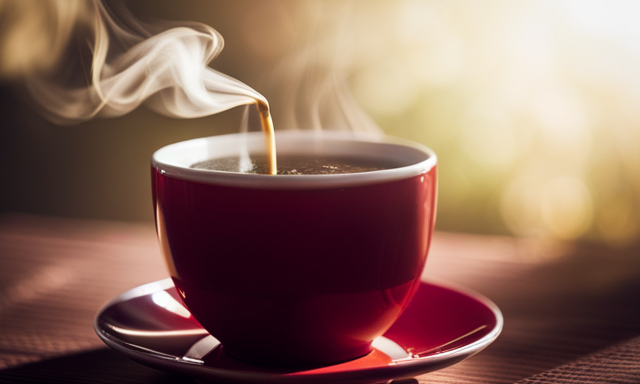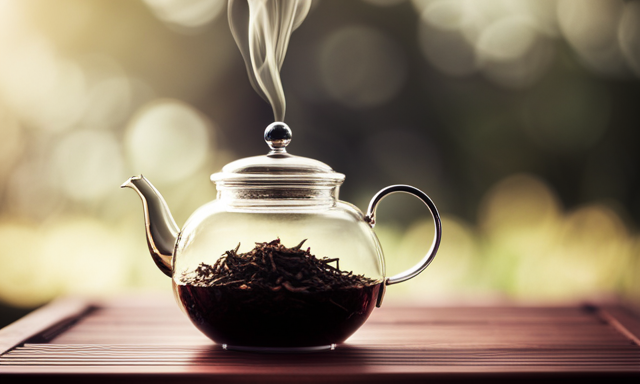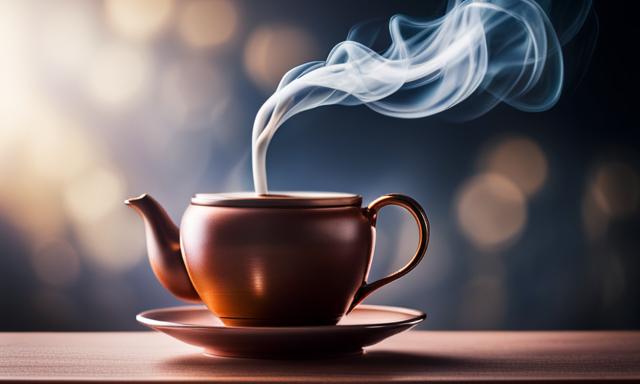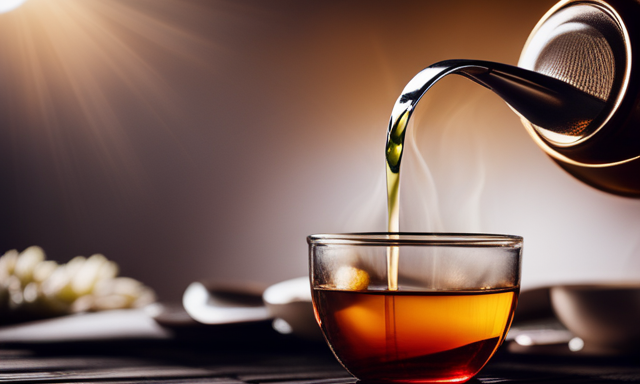I love starting my day with a warm cup of tea, and one of my favorites is oolong tea. But have you ever wondered how much caffeine is in oolong tea? Well, you’re in the right place! In this article, we will explore the caffeine content in oolong tea and how it affects our bodies.
Oolong tea is a traditional Chinese tea that falls between black and green tea in terms of oxidation. It has a unique flavor profile and is known for its numerous health benefits. But when it comes to caffeine, oolong tea is a bit of a mystery.
Join me as we delve into the world of oolong tea and discover the truth about its caffeine content. We will explore how caffeine affects our bodies, brewing techniques for different caffeine levels, and debunk some common myths about caffeine in oolong tea.
So grab a cup of oolong tea and let’s dive in!
Key Takeaways
- Oolong tea contains a moderate amount of caffeine.
- The caffeine content in oolong tea is lower compared to black tea or coffee.
- The average cup of oolong tea contains 30-50 milligrams of caffeine.
- The caffeine content in oolong tea can vary based on brewing time and tea variety.
What is Oolong Tea?
If you’re looking for a tea that strikes the perfect balance between the rich flavors of black tea and the light, floral notes of green tea, oolong tea is the perfect choice for you.
Oolong tea is a traditional Chinese tea that is partially oxidized, giving it a unique flavor profile. It offers a range of health benefits, including improving heart health, boosting metabolism, and aiding in weight management.
Oolong tea also contains antioxidants that help fight off free radicals and reduce the risk of chronic diseases. There are several varieties of oolong tea available, each with its own distinct taste and aroma. From the dark and robust Tie Guan Yin to the delicate and fragrant Bai Hao, there’s a flavor for every tea lover.
Now, let’s explore the caffeine content in oolong tea.
Caffeine Content in Oolong Tea
Contrary to popular belief, oolong tea contains a surprising amount of pep. While it may not have as much caffeine as coffee or black tea, oolong tea still packs a punch.
On average, an 8-ounce cup of oolong tea contains about 37-55 milligrams of caffeine. The caffeine content can vary depending on factors such as the brewing techniques used and the type of oolong tea.
However, it is important to note that oolong tea also contains other compounds like theanine, which can have a calming effect and balance out the stimulating effects of caffeine.
Additionally, oolong tea has been associated with various health benefits, including improved heart health, weight management, and reduced risk of chronic diseases.
Transitioning into the next section, understanding how caffeine affects the body can further shed light on the effects of oolong tea.
How Caffeine Affects the Body
To truly understand the impact of caffeine on your body, it is essential to explore its physiological effects. Caffeine can have both positive and negative effects on the body, depending on the individual and the amount consumed.
Some of the key effects of caffeine include increased alertness, improved focus and concentration, and enhanced physical performance. However, it can also disrupt sleep patterns, especially if consumed close to bedtime. Caffeine stimulates the central nervous system, which can make it harder to fall asleep and stay asleep.
Additionally, excessive consumption of caffeine has been linked to an increased risk of anxiety and other mental health issues. It is important to be mindful of your caffeine intake and its potential effects on both sleep and mental health.
Moving on to brewing oolong tea for different caffeine levels…
Brewing Oolong Tea for Different Caffeine Levels
When it comes to brewing oolong tea, adjusting the brewing time and temperature can help control the caffeine content. By steeping the tea for a shorter time or using cooler water, you can reduce the caffeine levels.
Additionally, there are tips for maximizing flavor while minimizing caffeine intake. One tip is to use high-quality oolong leaves, as they tend to have a more balanced flavor profile. Another tip is to experiment with different steeping methods, such as using a gaiwan or a traditional teapot, as this can affect the caffeine extraction.
Overall, brewing oolong tea allows for flexibility in controlling caffeine levels and finding the perfect balance of flavor and stimulation.
Adjusting brewing time and temperature to control caffeine content
Enhance your oolong tea experience by experimenting with brewing time and temperature to tailor the tantalizing taste and tame the caffeine content. Adjusting caffeine levels in oolong tea can be achieved through various brewing techniques.
The caffeine content in tea leaves is influenced by factors such as water temperature and steeping time. To reduce caffeine, lower the water temperature to around 175°F and steep for a shorter duration, around 1-2 minutes.
Alternatively, if you prefer a stronger brew with higher caffeine, increase the water temperature to 195-205°F and steep for 3-5 minutes. These adjustments allow you to fine-tune the caffeine content to your liking.
In the next section, we will explore tips for maximizing flavor while minimizing caffeine intake, so you can fully enjoy the rich taste of oolong tea.
Tips for maximizing flavor while minimizing caffeine intake
Discover simple yet effective techniques to savor the exquisite flavor of oolong tea while keeping your caffeine intake to a minimum.
-
Adjust brewing techniques: Brew oolong tea at a lower temperature and for a shorter duration to reduce caffeine extraction. This can be done by using water around 160-180°F and steeping for 1-2 minutes instead of the usual 190-200°F and 3-5 minutes.
-
Opt for lighter oolong varieties: Lighter oolong teas, such as green oolong or pouchong, generally contain less caffeine compared to darker varieties like black oolong.
-
Consider decaffeinated oolong tea: If caffeine sensitivity is a concern, decaffeinated oolong tea is available and can provide a flavorful alternative with minimal caffeine content.
By implementing these brewing techniques and choosing lighter oolong tea varieties or decaffeinated options, you can maximize the flavor of your oolong tea while minimizing caffeine intake.
Transitioning into the subsequent section about caffeine sensitivity and oolong tea, it is important to understand how caffeine affects individuals differently.
Caffeine Sensitivity and Oolong Tea
If you’re a fan of oolong tea, you’ll be interested to know how your caffeine sensitivity can impact your enjoyment of this delicious beverage. Caffeine sensitivity management is crucial for individuals who are more sensitive to its effects.
Oolong tea contains caffeine, although in varying amounts depending on the specific type and brewing method. However, if you find that oolong tea still affects your sleep or causes jitteriness, you may want to consider alternative caffeine sources.
Decaffeinated oolong tea is an option for those who want to enjoy the flavor without the stimulating effects of caffeine. Additionally, herbal teas like chamomile or peppermint can provide a soothing and caffeine-free alternative.
Understanding your caffeine sensitivity and exploring alternative options can help you maximize your enjoyment of oolong tea without the unwanted side effects.
Now, let’s delve into the role of caffeine in oolong tea’s effects.
The Role of Caffeine in Oolong Tea’s Effects
In my research on oolong tea, I’ve discovered that the interaction between caffeine and other compounds in this beverage plays a significant role in its effects.
Caffeine, as a stimulant, contributes to the taste, aroma, and overall experience of oolong tea by providing a natural boost of energy and alertness.
Additionally, caffeine in oolong tea can also interact with other compounds to create a unique flavor profile that distinguishes it from other types of tea.
The interaction between caffeine and other compounds in oolong tea
Contrary to popular belief, the harmonious interaction between caffeine and other compounds in oolong tea creates a truly unique and invigorating experience. Here are four ways in which this interaction enhances the overall benefits of oolong tea:
-
Interaction with antioxidants: Caffeine in oolong tea works synergistically with the abundant antioxidants present in the tea leaves. This combination boosts the body’s ability to fight off harmful free radicals, promoting overall health and well-being.
-
Impact on digestion: The presence of caffeine in oolong tea stimulates the production of gastric acids, aiding in digestion. This can help prevent issues like indigestion and bloating, allowing for a more comfortable post-meal experience.
-
Increased mental alertness: The interaction between caffeine and other compounds in oolong tea promotes increased focus, mental clarity, and alertness. This can be especially beneficial during long work or study sessions.
-
Enhanced flavor profile: The presence of caffeine contributes to the distinctive taste and aroma of oolong tea. It adds a subtle bitterness and depth to the overall flavor, making each sip a delight.
Now, let’s explore how caffeine contributes to the taste, aroma, and overall experience of oolong tea.
How caffeine contributes to the taste, aroma, and overall experience of oolong tea
Get ready to savor the rich and aromatic experience of oolong tea, as caffeine plays a pivotal role in enhancing its taste and overall enjoyment.
Caffeine affects the flavor of oolong tea in several ways. It adds a subtle bitterness that balances out the natural sweetness of the tea, creating a complex and layered taste profile.
Additionally, caffeine acts as a natural stimulant, enhancing the overall sensory experience by providing a gentle energy boost.
As for the impact on the aroma of oolong tea, caffeine contributes to its enticing fragrance. It helps release the tea’s aromatic compounds, creating a captivating aroma that entices the senses.
With its influence on both flavor and aroma, caffeine truly elevates the experience of drinking oolong tea.
Now, let’s explore the myths and facts surrounding caffeine and oolong tea.
Caffeine and Oolong Tea: Myths vs. Facts
There are a number of common misconceptions about the caffeine content in oolong tea that need to be clarified.
Contrary to popular belief, oolong tea actually contains a moderate amount of caffeine, falling somewhere between green tea and black tea.
It is important to understand the true effects of caffeine in oolong tea on the body, as it can vary depending on factors such as individual tolerance and consumption levels.
Common misconceptions about caffeine in oolong tea
Despite what some may think, oolong tea does contain caffeine. However, it’s important to remember that moderation is key when enjoying this delicious beverage.
Busting misconceptions, oolong tea is often believed to be caffeine-free or have very little caffeine content. However, this is a myth that needs debunking. While oolong tea generally has lower caffeine levels compared to black tea or coffee, it still contains a significant amount.
On average, a cup of oolong tea can contain around 30-50 milligrams of caffeine. This amount can vary depending on factors such as the brewing time and the specific oolong tea variety.
Understanding the true effects of caffeine in oolong tea on the body is crucial for making informed choices about consumption. Transitioning into the subsequent section, let’s delve into clarifying the true effects of caffeine in oolong tea on the body.
Clarifying the true effects of caffeine in oolong tea on the body
When you sip on a warm cup of oolong tea, your body may experience a gentle energy boost, allowing you to feel refreshed and ready to take on the day. Oolong tea contains caffeine, which can have various effects on the body.
The metabolism of caffeine in oolong tea differs from other sources, as it is absorbed more slowly, resulting in a prolonged release of energy. This can lead to sustained alertness without the jitters or crashes associated with other caffeinated beverages.
Additionally, oolong tea offers numerous health benefits, such as improving mental alertness, boosting metabolism, and potentially reducing the risk of chronic diseases. However, it’s important to consider other factors, such as individual caffeine sensitivity and overall health, when incorporating oolong tea into your routine.
Transitioning into the subsequent section about ‘other factors to consider in oolong tea,’ it’s important to explore how brewing methods and steeping time can impact the caffeine content in your cup.
Other Factors to Consider in Oolong Tea
To fully appreciate the effects of oolong tea, you should also take into account other factors.
Adjusting the steeping time can affect the caffeine content in your cup of oolong tea. Steeping it for a shorter time will result in a lower caffeine concentration, while a longer steeping time will increase the caffeine content.
Additionally, the water temperature can influence the extraction of caffeine from the tea leaves. Using hotter water will result in higher caffeine levels, while cooler water will yield lower levels.
It’s also important to consider the quality of the tea leaves. Higher-quality leaves tend to have a more pronounced flavor and potentially higher caffeine content.
Understanding these factors can help you customize your oolong tea experience to suit your preferences.
Now, let’s explore the options for decaffeinated oolong tea.
Decaffeinated Oolong Tea Options
There are various options available for those looking for oolong tea without the caffeine. Decaffeinated oolong tea is a great alternative for individuals who still want to enjoy the taste and benefits of oolong tea without the stimulating effects of caffeine. Below is a comparison table of popular decaffeinated tea options:
| Decaffeinated Tea Options | Caffeine Content |
|---|---|
| Decaffeinated Oolong | <1 mg |
| Decaffeinated Green | <1 mg |
| Herbal Tea | Caffeine-free |
Decaffeinated oolong tea typically contains less than 1 mg of caffeine, making it a suitable choice for those who are sensitive to caffeine or want to limit their intake. Additionally, other caffeine-free alternatives like herbal tea can also provide a similar flavor profile to oolong tea without any caffeine. It’s important to choose decaffeinated tea options that align with your personal preferences and dietary goals. Next, we will explore how to enjoy oolong tea responsibly, ensuring optimal enjoyment without excessive consumption.
Enjoying Oolong Tea Responsibly
Indulge in the rich and flavorful experience of sipping on a perfectly brewed cup of oolong tea. Allow yourself to fully appreciate its nuanced taste and subtle aromas. Oolong tea offers a delightful way to unwind and enjoy a moment of tranquility.
To enhance your enjoyment, here are some brewing techniques to consider:
- Use water heated to around 190-200°F for optimal flavor extraction.
- Steep the tea leaves for 3-5 minutes to achieve the desired strength.
- Experiment with different steeping times to find your perfect balance.
- Try multiple infusions to discover new flavors that unfold with each brew.
- Don’t forget to savor the aroma before taking your first sip.
Apart from its captivating taste, oolong tea also offers numerous health benefits. It contains antioxidants that may help boost metabolism and promote weight loss. Additionally, it may aid digestion and improve heart health. So, sip on a cup of oolong tea and enjoy its flavors while reaping the potential health rewards.
Frequently Asked Questions
Can oolong tea be consumed by pregnant women?
Yes, oolong tea can be consumed by pregnant women. It is low in caffeine compared to other teas, making it a safe choice. Oolong tea has also been linked to improved fertility in some studies.
Is it true that oolong tea can help with weight loss?
Yes, it is true that oolong tea can help with weight loss. Studies suggest that oolong tea benefits metabolism, helping to increase fat burning and promote weight loss.
Does oolong tea have any antioxidant properties?
Oolong tea offers antioxidant benefits due to its high polyphenol content. This helps protect the body from harmful free radicals. Additionally, it contains caffeine, which can provide a natural energy boost.
Can oolong tea help improve brain function and focus?
Oolong tea has brain-boosting benefits and can enhance cognitive function and focus. It contains compounds that promote alertness and mental clarity, making it a great choice for improving brain function.
Are there any potential side effects of consuming oolong tea?
There are potential health benefits associated with consuming oolong tea, such as improved brain function and focus. To brew oolong tea properly, use water just below boiling point and steep for 3-5 minutes.
Conclusion
After learning about the caffeine content in oolong tea and how it affects the body, it’s clear that this delightful beverage should be enjoyed responsibly.
With its varying caffeine levels depending on brewing methods, oolong tea offers options for those seeking a little boost or a milder experience.
Don’t let myths mislead you – oolong tea can be a part of a healthy lifestyle.
So, grab a cup of oolong tea, savor its flavors, and let it take you on a journey of relaxation and invigoration.










